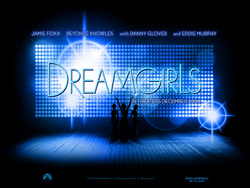How Much Will You Pay to See a Musical (Film)?
 One of the greatest lessons I took from grad school was the understanding that people had to be convinced their leisure time was worth paying for. It wasn't until the Elizabethan age of drama (when Shakespeare and Ben Jonson were at their peak) that the idea of paying for theater was invented. It seems so natural now, of course, that we fork over cash for the right to be entertained. Theater, television, even reading... it almost always costs something. But that was a notion that had to be invented, just like a light bulb or a toaster oven. Someone had to get the idea to sell tickets.
One of the greatest lessons I took from grad school was the understanding that people had to be convinced their leisure time was worth paying for. It wasn't until the Elizabethan age of drama (when Shakespeare and Ben Jonson were at their peak) that the idea of paying for theater was invented. It seems so natural now, of course, that we fork over cash for the right to be entertained. Theater, television, even reading... it almost always costs something. But that was a notion that had to be invented, just like a light bulb or a toaster oven. Someone had to get the idea to sell tickets.And in the forward march of evolution, some has now gotten the idea that a movie shown on a regular screen should cost $25. (IMAX tickets are already about that high.)
The trick? Call it VIP seating. For the first ten days of its release (December 15-24), "Dreamgirls" will be shown on only three screens--one each in New York, LA, and San Francisco--and every ticket will be $25. In New York, at least, the film is being shown in a one-screen house, so attending could very well feel like a premiere.
Along with an early peek at a movie that is rumored to be pretty good (one of my editors thinks so, at least), VIP ticket buyers also get a fifty-page, full color program and the chance to look at a lobby full of costume pieces and other "making-of" displays. Finally, because nothing says "elite" like spending more money, the film's website reports that "moviegoers will have the chance to purchase exclusive merchandise and the film's soundtrack in the lobby."
 I am not so naive as to scream from my desktop that this manipulative ploy from Paramount Pictures will be jeered as the obvious bilking of consumers that it is. People made similar complaints when acts like the Rolling Stones started charging over $100 per concert ticket, but that hasn't hurt their ticket sales.
I am not so naive as to scream from my desktop that this manipulative ploy from Paramount Pictures will be jeered as the obvious bilking of consumers that it is. People made similar complaints when acts like the Rolling Stones started charging over $100 per concert ticket, but that hasn't hurt their ticket sales.This effort to convince us that a movie is more valuable if seen on December 22 instead of December 29 may work. And if it comes anywhere close to being profitable, you can bet there will be special screenings of Hairspray or the next Harry Potter movie.
Personally, though, I hope this gambit fails. Though I can't really cheer about the idea of a $100 Broadway ticket or a $150 charge for a so-so seat at a U2 show, I can at least concede that in paying those prices, I am getting to see a unique event. Even if I'm in the back row, I'm experiencing a live performance that cannot be duplicated.
But why would I spend $25 to see the exact same movie I can see in two weeks for $10 or in seven months for a rental fee? Even if I think that seeing a movie on a big screen makes it feel like more of an event--and I do think that--why would I think that seeing it ten days before my co-workers was worth that much more money? Do I really need a souvenir program that much?
I'm sure there are some people who feel they do, and maybe there are enough to fill a week's worth of VIP shows. Maybe there's some cultural need this experiment will fill.
But what I see underneath this "event" is more than a studio's attempt to reach the core fans of "Dreamgirls" with a fanatics-only package. I see an attempt to make moviegoing seem glamorous again. Glamorous in the way it was when you could only see a movie at the theater, instead of in your house or on your computer or even on your iPod. Since the advent of that technology, it's become conventional wisdom that going to the movies is losing its luster, so studios and cinema owners are trying to get us out of our living rooms.
But while I love going to the movies, I don't think they're $25 worth of glamorous. Those people on that screen aren't really there. (Obviously, live performance is one of my major criteria for determining a ticket's value.)
 Already, the rising cost of tickets has made me classify certain movies as being perfect candidates for Netflix, and I love going to the movies more than most people I know. I find it ludicrous that I'm expected to believe any movie is so special that it merits that much of a financial investment. To be really Southern about it, it's like the movies are getting too big for their britches. Even at their most avant garde, they are for the masses. Movies are mass-produced and shipped all over the world. They will never be exclusive. That's part of what makes them so appealing.
Already, the rising cost of tickets has made me classify certain movies as being perfect candidates for Netflix, and I love going to the movies more than most people I know. I find it ludicrous that I'm expected to believe any movie is so special that it merits that much of a financial investment. To be really Southern about it, it's like the movies are getting too big for their britches. Even at their most avant garde, they are for the masses. Movies are mass-produced and shipped all over the world. They will never be exclusive. That's part of what makes them so appealing.Trying to gussy films up with specialty tickets and lobby displays is like serving champagne in the first three cars of the roller coaster. No matter what, everyone's getting the same ride.
I also feel this way about certain theaters that charge extra for reserved seating or to cover the cost of the fancy art down by the bathrooms. I know I keep saying this, but no amount of frippery can make it more special to see mechanical images projected on a flat screen, any more than a gold-plated CD makes it more exquisite to hear a singer's recorded voice. (As a side note: I would pay more to see a movie at a theater where ushers really did their jobs and kicked out loud, obnoxious fools.)
That's why I hope this "Dreamgirls" thing fails, proving there are some prices we will not pay to be entertained. History is not on my side here, but I'm hopeful.
Labels: TV / Movies / Etc.

2 Comments:
Word.
I hope this gambit fails, too, as I am someone who really does enjoy going to see a movie on opening night. In fact, if I have not seen a movie in its first week or two, I very often prefer to wait until it is on DVD.
The reason is, quite frankly, the energy and mood provided by an eager audience. Call me a sucker for ritual commercial experiences, but I like going to see a highly anticipated movie with a roomful of strangers who are also caught up in the anticipation.
This is also an entertainment experience that relies on living people, although not the performers.
But of course $25 would be cost prohibitive for us. And what I would imagine happening is that we would actually see fewer movies in the theater in general, lacking the incentive of the opening week experience. I doubt we'd be alone.
That said, I suspect this market strategy is primarily designed for upscale coastal audiences, and not we folk in Georgia. Sometimes it's good to be down market.
Post a Comment
<< Home